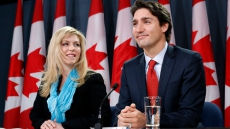OTTAWA — It's not just political parties that will be spending money hand over fist if Stephen Harper fires the starting gun for the Oct. 19 federal election weeks earlier than necessary.
Taxpayers will be shelling out big bucks, too — millions in extra administrative costs and tens of millions more in rebates to parties and candidates for their inflated election expenses.
Speculation is rampant that Harper is poised to officially kick off the election campaign — known as the writ period — as early as this weekend.
That would make for an 11-week campaign, the longest federal campaign since 1926 and more than twice the five weeks typically allotted for campaigns in recent times.
Elections Canada estimates that a campaign this fall of 37 days — the minimum required by law — would cost roughly $375 million to administer.
The agency was not able to estimate how much more a longer campaign would cost, but spokeswoman Diane Benson acknowledged there would indeed be some additional expenses.
For instance, she said Elections Canada will have to pay for longer office leases for returning officers in each of the country's 338 ridings; telephones, equipment and furniture rentals for those offices; additional hours for staff; and Elections Canada staff who handle public inquiries.
A longer campaign puts the squeeze on taxpayers in other ways too, since they subsidize the donations that fuel campaigns and then subsidize parties and their candidates again for spending that money during a campaign.
Most of the money parties and candidates will be throwing around during the campaign comes from donations, which are worth a generous tax credit of 75 per cent on the first $400, 50 per cent on the next $350 and 33.3 per cent on the next $500.
The Canadian Taxpayers Federation estimates those tax credits are worth somewhere between $16 million and $36 million per year in foregone revenue.
Each party running a full slate of candidates is entitled to spend a maximum of about $25 million for a five-week campaign; each candidate an average of about $100,000.
But, under the recently passed Fair Elections Act, those spending limits will increase by 1/37 for each day a campaign exceeds 37 days. That's an extra $675,000 per day for each party's national campaign, an additional $2,700 per day for their candidates.
A campaign that is double the minimum length would effectively double the spending limits and, theoretically, double the amount of money parties and candidates stand to be reimbursed — by taxpayers — when it's all over.
Parties are entitled to rebates of up to 50 per cent of their eligible election expenses; candidates up to 60 per cent.
The major parties are promising to spend the maximum allowed, or very close to it. However, few candidates will likely be able to afford to take full advantage of increased spending limits, making it hard to estimate how much their rebates could go up.
Still, the rebates will undoubtedly be considerably higher than the rebates handed out to parties and candidates after the five-week election campaign in 2011. Elections Canada estimates that tab topped $60 million.
Aaron Wudrick, federal director of the taxpayers' federation, says his organization appreciates that elections, like other fundamental democratic institutions, deserve to be properly funded. In addition, his group does not take issue with leaving the length of campaigns to the prime minister's discretion.
However, he says abuses and excessive costs could be avoided if taxpayers weren't subsidizing donations to political parties in the first place.
"Our main position is to get rid of the subsidy," Wudrick says.
"If parties had to work harder for their money and/or had less of it, they wouldn't want longer writ periods. They'd be far more careful with their resources."





